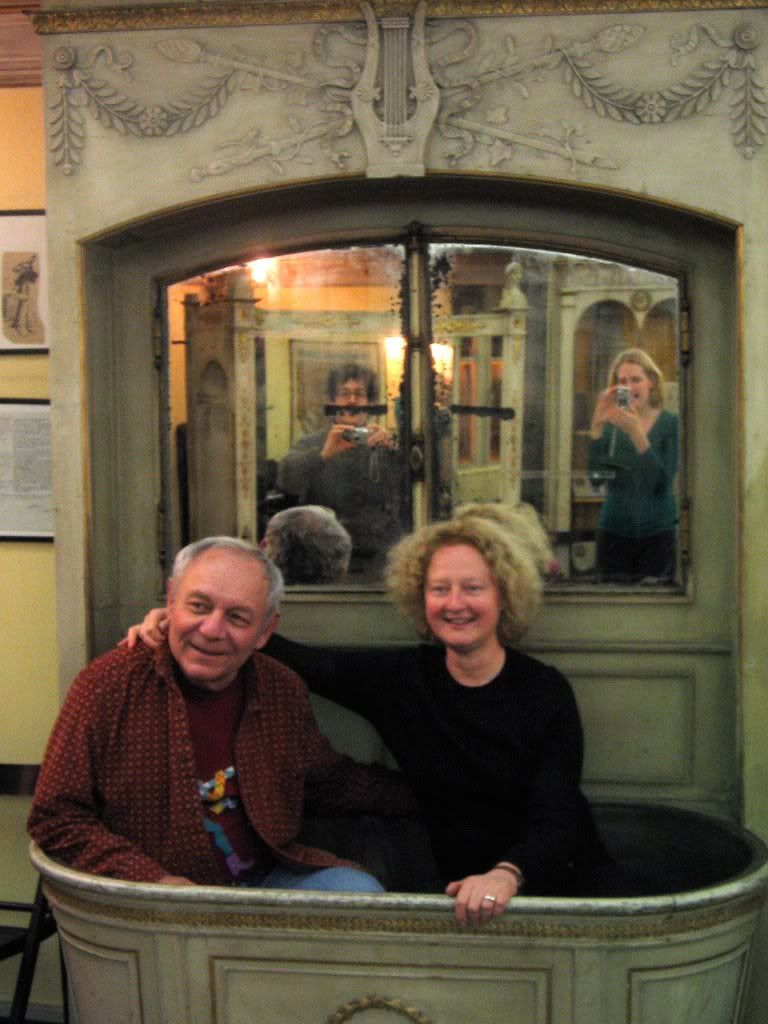In continuation of our occasional series, I am indebted to the early music pioneer Joel Cohen, emeritus music director of the Boston Camerata, for a portrait of himself in the tub with a consenting consort, Anne Azéma.
The tub is no ordinary tub. It once belonged to the magnificent Sarah Bernhardt. I would surmise, from Bob Gottlieb’s new biography, that she did not often bathe in it alone.
Bathtime pictures of eminent musicians are always welcomed on this site.

In continuation of our occasional series, I am indebted to the early music pioneer Joel Cohen, emeritus music director of the Boston Camerata, for a portrait of himself in the tub with a consenting consort, Anne Azéma.
The tub is no ordinary tub. It once belonged to the magnificent Sarah Bernhardt. I would surmise, from Bob Gottlieb’s new biography, that she did not often bathe in it alone.
Bathtime pictures of eminent musicians are always welcomed on this site.

All year long, Universal Music has been negotiating a merger with the London artists agency, Harrison Parrott. The deal was intended to reboot Universal’s management wing, which has been losing artists and credibility, and to give Jasper Parrott a boost to his pension pot.
The proposed merger has just died, and there are two lines being spun. Parrott is telling his artists, ‘it has been amicably decided not to proceed’. Universal tell me: ‘we’re not getting married, we’re not even living together, but we might screw from time to time.’ Parrott says: ‘we’re working flexibly together’.
Before we look at causes and consequences, let’s write the thing down for what it is – an extremely expensive executive failure. The talks have been going on for so long, and with so much legal time, that the bill is certainly greater than any HP pianist – except perhaps Hélène Grimaud – will earn in a month of Tuesdays. And the failure also delivers a crippling blow to Universal’s aim to own a chunk of everything its artists do, live or recorded.
There is no single reason for the collapse, although I understand there was opposition to it from individuals within both companies and many artists were uncomfortable at the prospect of entering corporate servitude. There were several sticking points in the Universal contract and I am told that both sides were concerned by a change of mood that arose from matters that I exposed in this space and elsewhere. If that’s true, I am very glad of it.
The winners are such HP conductors as Sakari Oramo, Paavo Järvi, Mikko Franck and Susannah Mälkki who would have struggled to reconcile their independence of mind with the corporate rulebook. They and many soloists are heaving a huge sigh of relief.
The losers, aside from Parrott and his partner Linda Marks, are three Universal suits. Michael Lang, head of Deutsche Grammophon, was the lynchpin of the talks; Jeffrey Vanderveen and Manfred Seipt are the joint heads of the Universal agency wing. All will be feeling that bit shakier in their seats today.
The option for Universal now is either to buy another agency (unlikely) or to write off its own agency as a legacy of its last leader, Chris Roberts, and turn a new, less oppressive leaf in its relationships with the artists that produce its wealth. I know which course I would advise.
All year long, Universal Music has been negotiating a merger with the London artists agency, Harrison Parrott. The deal was intended to reboot Universal’s management wing, which has been losing artists and credibility, and to give Jasper Parrott a boost to his pension pot.
The proposed merger has just died, and there are two lines being spun. Parrott is telling his artists, ‘it has been amicably decided not to proceed’. Universal tell me: ‘we’re not getting married, we’re not even living together, but we might screw from time to time.’ Parrott says: ‘we’re working flexibly together’.
Before we look at causes and consequences, let’s write the thing down for what it is – an extremely expensive executive failure. The talks have been going on for so long, and with so much legal time, that the bill is certainly greater than any HP pianist – except perhaps Hélène Grimaud – will earn in a month of Tuesdays. And the failure also delivers a crippling blow to Universal’s aim to own a chunk of everything its artists do, live or recorded.
There is no single reason for the collapse, although I understand there was opposition to it from individuals within both companies and many artists were uncomfortable at the prospect of entering corporate servitude. There were several sticking points in the Universal contract and I am told that both sides were concerned by a change of mood that arose from matters that I exposed in this space and elsewhere. If that’s true, I am very glad of it.
The winners are such HP conductors as Sakari Oramo, Paavo Järvi, Mikko Franck and Susannah Mälkki who would have struggled to reconcile their independence of mind with the corporate rulebook. They and many soloists are heaving a huge sigh of relief.
The losers, aside from Parrott and his partner Linda Marks, are three Universal suits. Michael Lang, head of Deutsche Grammophon, was the lynchpin of the talks; Jeffrey Vanderveen and Manfred Seipt are the joint heads of the Universal agency wing. All will be feeling that bit shakier in their seats today.
The option for Universal now is either to buy another agency (unlikely) or to write off its own agency as a legacy of its last leader, Chris Roberts, and turn a new, less oppressive leaf in its relationships with the artists that produce its wealth. I know which course I would advise.

